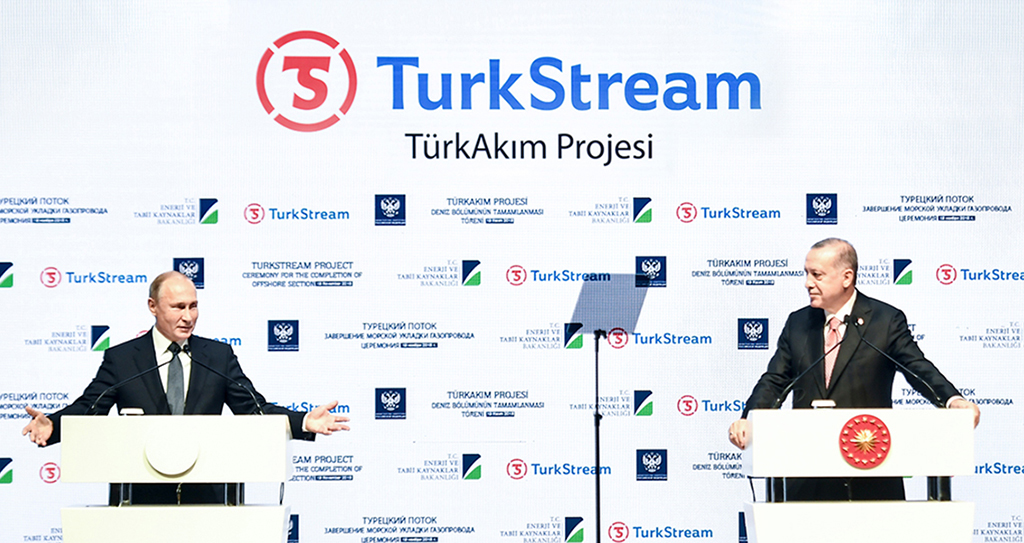Urban legends about Turkey's foreign policy
Public scrutiny of foreign policy is the backbone of democracy. Criticism, when firmly rooted in a rational analysis of the balance of power and national interest, can be constructive. However, when critiques resort to populism, however, they become ideological.
More


SETA Security Radar | Turkey's Security Landscape in 2020
SETA Security Radar attempts to anticipate the course of major security issues Turkey faces and how to develop and enhance sound and relevant responses within this increasingly challenging regional security environment.
More
TurkStream substantially contributes to bringing to the foreground an aspect of energy sources that strengthens cooperation and provides economic benefit rather than conflict.
With tensions between Iran and the United States de-escalating for now, there is talk about cease-fire agreements in Libya and Idlib.
With Hungary, Bulgaria and Serbia to depend on TurkStream, Turkey’s importance to increase in terms of energy security
Following Turkey's decision to throw its weight on regional developments and be a more influential actor in the Mediterranean, countries trying to exclude Ankara and its rights, have been uneasy
The sole logic behind Turkey's Libya mandate
Turkish Parliament on Thursday authorized President Recep Tayyip Erdoğan and his administration's plans to deploy troops to Libya. The deployment bill passed with the support of the People's Alliance, with 325 votes in favor, despite opposition from the Republican People's Party (CHP), the Peoples' Democratic Party (HDP) and the Good Party (İP).
More


Future holds confrontation, not surrender, for Turkey
The Republican People's Party (CHP) is making headlines again. Last month, there was the (false) allegation that a senior member of the main opposition party had visited President Recep Tayyip Erdoğan to receive his endorsement in the upcoming race for CHP chairman.
More
The fall of Tripoli could undermine European energy security and unleash a new refugee wave on already overwhelmed countries
Insight Turkey, one of the leading academic journals in Turkey, in its latest issue entitled as “Turkey’s New Foreign Policy: A Quest for Autonomy,” resonates on the importance of Turkey’s increasing role and effectiveness in the international realm.
The U.S. Congress, acting under the influences of anti-Turkey sentiment in Washington, is back in the game.
The traditional notion of the 'Western alliance' is no longer relevant for Ankara, which has instead adopted a more effective approach dominated by its own diplomatic agenda
The NATO leaders' meeting went better than expected. In the alliance's final communique, released after talks concluded on Dec. 4, nations reiterated their commitment to Article 5 of the Washington Treaty, stressed the importance of financial burden-sharing and underlined their intention to seek a common position regarding migration, as well as a united front on cyber and hybrid threats. Noting Russian aggression as posing a possible threat, NATO members called for dialogue with Moscow on intermediate-range missiles. Furthermore, as per Washington's request, the organization hinted it would be turning its attention to the Asia-Pacific region, in a nod to Beijing's expanding influence.
NATO, a 70-year-old military alliance, faces new strategic questions. The challenges that the organization encounters are diverse. Russian cyber-meddling in Western democracies, China's move to buy European infrastructure, Washington's reckless effort to undermine the liberal order, the rise of populism in Europe, terrorism and the refugee crisis are among them. At the same time, there is the question of "what kind of ally" Turkey is.
Another important meeting in Washington between President Recep Tayyip Erdoğan and U.S. President Donald Trump is expected to be held next week. The state of Turkish-American relations and the crises between the countries make this meeting more critical than any other to date between the two leaders.
Turkey initiated a large-scale Westernization project immediately after the declaration of the Republic. It had decided to follow the footsteps of the enemy it had fought during World War I and the Independence War. It introduced many political, economic, even social and cultural reforms during the first two decades of the interwar period. In the wake of World War II, the Soviet threat further paved the way for Turkey's alliance with the West.
Last week, anti-Turkey activism in Washington reached new heights. For the last one month, the campaign against Turkey deteriorated the ties between the two countries at the public level. In addition to setting a tone against Turkey in the U.S., it also generated a serious reaction from the Turkish public against the U.S.
From sanctions against Turkey to cooperation with nonstate actors, the U.S. establishment seeks ways to help the PKK form a statelet in the region
The Turkey-US agreement is a great second chance for Washington to reformulate its inconsistent Syria policy
The primary purpose of the Turkish operation is to drive out terrorist groups threatening regional security and secure the area in line with international law
Although their practices are already beyond the pale in terms of journalistic ethics, both the U.S. and the European media are apparently seeking to set a new record with regard to their old prejudices

















